Rwanda. The Power of the Beat.
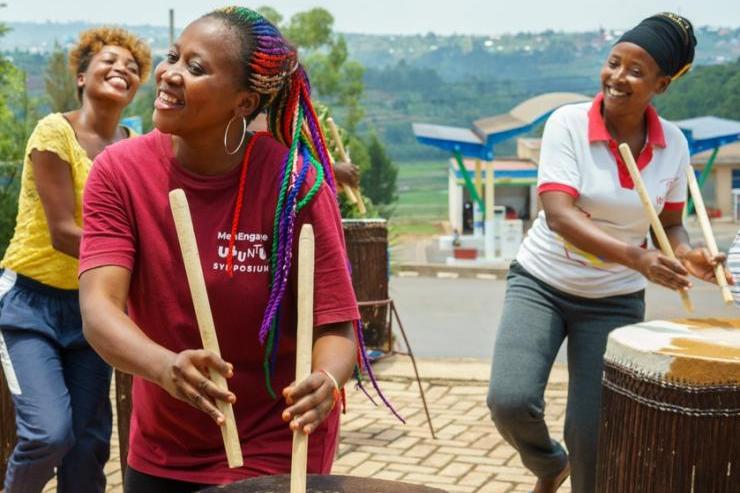
Ingoma Nshya is the country’s first female percussion troupe. Reconciliation, healing and peace are part of the group journey.
We went to meet them.
About 125 kilometres south of Kigali, and after an endless sequence of hills, is Huye. With nearly 320,000 inhabitants, until 2013 it housed the oldest university in the country. Here you can visit the Ethnographic Museum, where traditional tools from the era of the last Rwandan kings are kept. These vestiges, indispensable in Rwanda, seem to be renewed by observing the movements, songs and acrobatics of the twenty women who almost twenty years ago created the first group that plays the traditional drums of the country.
Odile Gakire Katese, an actress, theatre director, poet and drummer, was the founder of Ingoma Nshya (ingoma can mean ‘new’, ‘kingdom’ or ‘power’, and nshya refers to ‘drum’). In the same year, 2004, her daughter Aurore was born, who proudly welcomes us to a mixed bookshop and ice cream parlour called Sweet Dreams, converted into a rehearsal room after the pandemic.
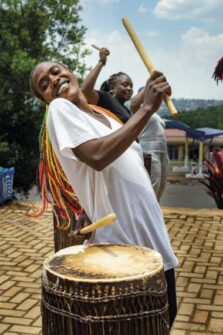
Every day, they bring the traditional drums outdoors, to a raised space from which you can see the Huye prison – there the Prison Fellowship Rwanda organization began its work of reconciliation between the perpetrators and relatives of the victims of the genocide – to repeat the movements, feel the rhythm and feel how your body seems to merge with the solid structure of the drum. They dance with the tool that has allowed them to obtain an economic resource – they receive a monthly salary for this activity – travel, create and, above all, feel free.
“I just finished high school and I would like to fully immerse myself in Ingoma Nshya because it has always been present in my life. If I have the skills, I want to join them”, says Aurore Katese. She explains the differences between the types of drums women use and insists on the need to find new ways to express themselves because the group has been around for many years.
“When Ingoma Nshya started, only ten years had passed since the genocide, reconciliation was difficult and people could not integrate, it was unthinkable that those who killed and the relatives of the deceased or the injured, the victims, would unite”, says Aurore.
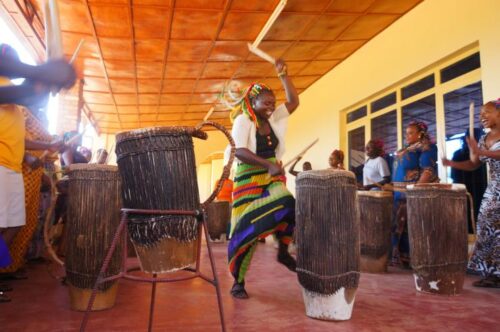
“Playing the drum relaxes us and we believe it brings peace” (Photo: Ingoma Nshya)
Could the drums have been a way to be able to reconcile people? Aurore continues: “Women were forbidden to play the drum and my mother wondered why. Not because women didn’t have the strength to play this instrument, but simply because they were deprived of it”, she continues.
Odile Gakire Katese started by inviting women to practice playing the drums after they finished their household chores while their children were at school. After the genocide, women were more than 70% of the population, so they had to change roles. They began to carry out jobs traditionally associated with men: bricklayers, politicians, soldiers, lawyers… In short, they assumed the responsibility of moving the country forward. This change marked Rwanda’s opening up to the issue of gender, a moment Gakire Katese took advantage of to write a new chapter in the national culture. What began as a necessity to keep ancestral customs alive has also helped heal the wounds of genocide.
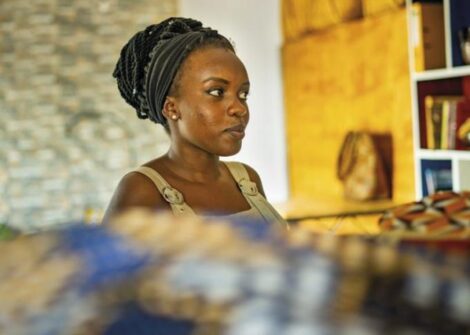
Aurora, daughter of Odile Gakire Katese founder of Ingoma Nshya. (Photo: Carla Fibla García-Sala)
However, in all this time, they have not had an even reception in Rwanda where they do not meet the same enthusiasm as the international festivals they have participated in since 2009. Their performances in their home country are limited and they do not have access to public funds for the ‘art’. This is why Marie Moella Uwsenma, 45 years old and a member of the group since 2008, recalls the trip they made to Great Britain. People applauded them so much that they were moved, “everyone stood up and showed us how much they liked it… It was a gift”.“In my case, joining the group in 2008 was not something improvised. My neighbour was playing the drum and I really enjoyed watching and listening to him. At one point, he invited his wife to learn, and since she showed an interest in rhythms, they asked me to join them. That’s how I started”, explains Marguerite Mushimiyimana. At 29 she is one of the youngest of the group, although she has been perfecting her technique for 14 years.“Watching the women play the drum I wondered why not me. I told my husband I wanted to join Ingoma Nshya and he accepted”, says Uwsenma, for whom playing the drum is “a natural thing for me, something I don’t have to force myself to do”. There she feels ‘relaxed and happy’ just like her companions, which is easy to appreciate when they get behind the drums.
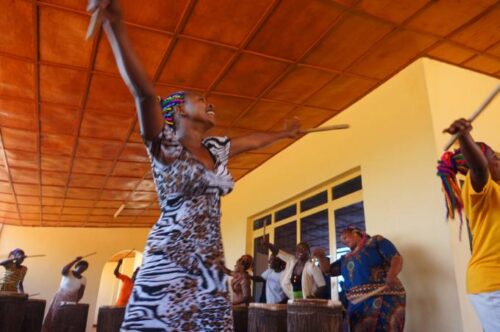
“We play our way. We swing the whole body, turn, squat, jump… Our style is dynamic”. (Photo: Ingoma Nshya)
On Saturdays, they go to schools to teach their art to boys and girls. “Many ask their parents to enlist them, and there are also parents who decide that drumming is part of their upbringing”, says Uwsenma, who wanted to join the army as a child.
“With our group, we have overcome social differences and segregation. Here we are all the same, we feel united by the drum”.
“You can’t change the past or make social problems disappear, but playing the drum relaxes us and we believe it brings peace. What we do must please us and those who come to our show. This encourages us, rebuilds us and we feel that it generates something good”, adds Moella Uwsenma listening carefully to Marguerite, who nods: “We play our way. While the men remain static, we swing the whole body, turn, squat, jump… Our style is dynamic”. (Open Photo: Carla Fibla García-Sala)
Carla Fibla García-Sala



